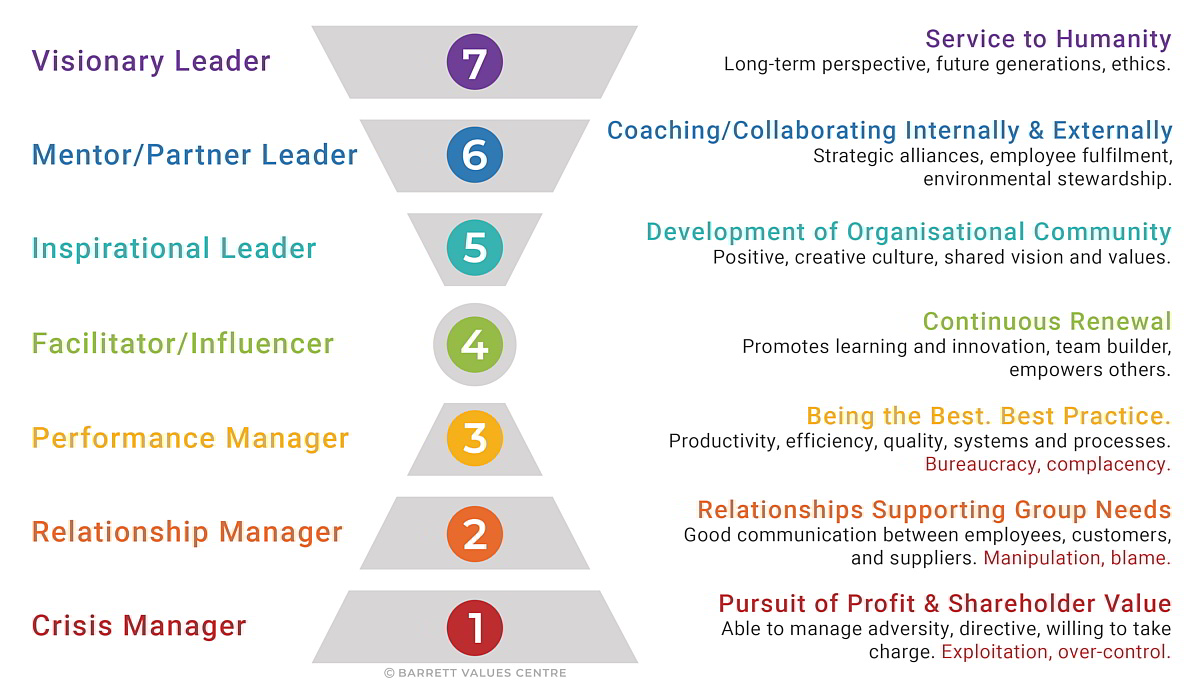
THE 7 LEVELS OF
Leadership Consciousness
Leadership Consciousness

Level 1: Crisis Manager
Crisis Managers are strongly motivated by the need to control. They use a dictatorial style to get what they want because they find it difficult to relate to people in an open and caring way. They are afraid of their emotions. They don't ask. They give orders. They are afraid to let go of the reins of power because they have great difficulty in trusting others. The greater their fears, the more risk-averse they become. They are quick to anger and feel uncomfortable discussing emotions. If they have insecurities around money, they will exploit others for their own ends. Authoritarians can create emotionally unhealthy climates in which to work.
Level 2: Relationship Manager
Relationahip Managers are motivated by the need to form relationships. They are basically authoritarians who need to be liked. Unfortunately, their need to be liked cannot overcome their need to control. So they become benevolent dictators. They are protective of their people, but demand loyalty, discipline and obedience in return. They will ask your opinion in order to make you feel they care, but will go ahead and do what they want anyway. In this sense they are manipulative. The fears of paternalists are such that they find it very difficult to trust others. This type of consciousness often occurs in family-run businesses. Anyone outside the family is not to be trusted. This severely limits the pool of talent from which the organization can draw. Paternalists create environments, which kill the entrepreneurial spirit of employees.
Level 3: Performance Manager
Performance Managers are motivated by the need for order and respect. They regard what they do as a science. They enjoy structure, measurement and rational analysis. Exercising their intellect has a strong appeal. Inwardly focused managers are good at organizing information and monitoring results. Outwardly focused managers anticipate workflow problems and get things done. They are productive and accomplish goals. They plan and prioritize their work and provide stability and continuity. They create schedules and enjoy being in control. They focus on training for skills and want to learn the latest management techniques. When managers' needs for respect are driven by subconscious fears, they become ambitious and competitive. They will play office politics to get what they want and they will avoid giving their boss bad news. Their need for order can get them stuck in status quo. Their need for rewards can lead them to work long hours and neglect their families. Mangers create environments, which are productive and efficient, but can be very demanding if they are not balanced.
Level 4: Facilitator/Influencer
Facilitators are in transition. They are learning to release their fears to move from being outer-directed to being inner-directed. They are in the process of self-actualization. As they let go of their need for approval, they begin to discover who they really are. As they let go of their need to control, they invite participation and consensus building. They become enablers-helping others to express themselves. They are no longer wedded to their career. Now they want to develop their vision and work on their mission. They want work which aligns with their inner passion, and they want to learn about themselves through training which focuses on personal growth. They become more open and innovative, and begin to search for balance in their lives. Balance leads to detachment and independence, and allows them to become objective about their strengths and weaknesses. They focus on interpersonal communication skills, conflict resolution and team building. Facilitators are in the process of shifting from being a manager to being a leader.
Level 5: Inspirational Leader
Inspirational Leaders are motivated by the need to find meaning. One of the ways they find meaning is by creating community. They are engineers of human capital and they build trust. They are more concerned about getting the best result for everyone than for their self-interest. They are flexible, adaptive and focused on values. They walk their talk. They are creative problem solvers. They recognize that they don't have to have all the answers. They are willing to be vulnerable. They are honest, truthful and willing to confront people and their mangers because they have little fear. They feel confident in handling any situation. This confidence and openness allows them to reclassify problems as opportunities. They are authentic, democratic and enthusiastic. They are intuitive and creative. They clarify priorities, communicate vision, and plan for the long-term. They display emotional as well as intellectual intelligence. Collaborators are good at bringing the best out of their people.
Level 6: Mentor/Partner Leader
Mentor/partners are motivated by the need to make a difference and be of service to those whom they lead. They serve the organization by creating partnerships and strategic alliances with external organizations. At the same time, they care for their people, seeking ways to ensure that employees find personal fulfillment through their work. They view situations from a systems perspective; seeing beyond the narrow boundaries of cause and effect. They build systems, which support employees, and they seek to form mutually beneficial alliances with suppliers and customers. They are active in the local community and building relationships, which create goodwill. They recognize the importance of environmental and social stewardship and will go beyond the letter of the law in making their operations environmentally friendly. They are empathetic and careful listeners. They are also mentors and coaches. Servant/partners create supportive internal and external linkages, which build commitment and goodwill.
Level 7: Visionary Leader
Visionary leaders are motivated by the need to be of service to the world. They are constantly asking, "How can I help?". Their vision is global. They see their own mission and that of their organization from a societal perspective. For them, the world is a complex web of interconnectedness and they know they have an important role to play. They play their role with humility. They are generous, forgiving and compassionate, and are able to relate to people at all levels. They are concerned about the state of the world-peace, justice, ethics and ecology. They have a very long-term perspective. They are concerned for the future generations. They are not prepared to compromise long-term outcomes for short-term gains. They enjoy solitude and are at ease with uncertainty. Consequently they have no fear. Visionary leaders are admired by all for their wisdom, vision and commitment to ethics.
Distribution of Consciousness
Every individual has values distributed across several levels of consciousness. No one is ever focused solely at one level. The values of most leaders are clustered around two or three adjacent levels of higher consciousness.
Cultural Transformation Tools® Barrett Values Centre
About ElevateWork
We are an international group of facilitators, trainers and coaches with a shared mission to elevate the world of work in collaboration with other like-minded, like-hearted leaders and organizations.
ElevateWork specializes in facilitating highly effective online meetings, holistic leadership mentoring and cultural change. Open Space Technology, Bohm Dialogue, online Open Space conferences, participative online meeting facilitation, Cohering Community, and facilitator training are our specialties.
